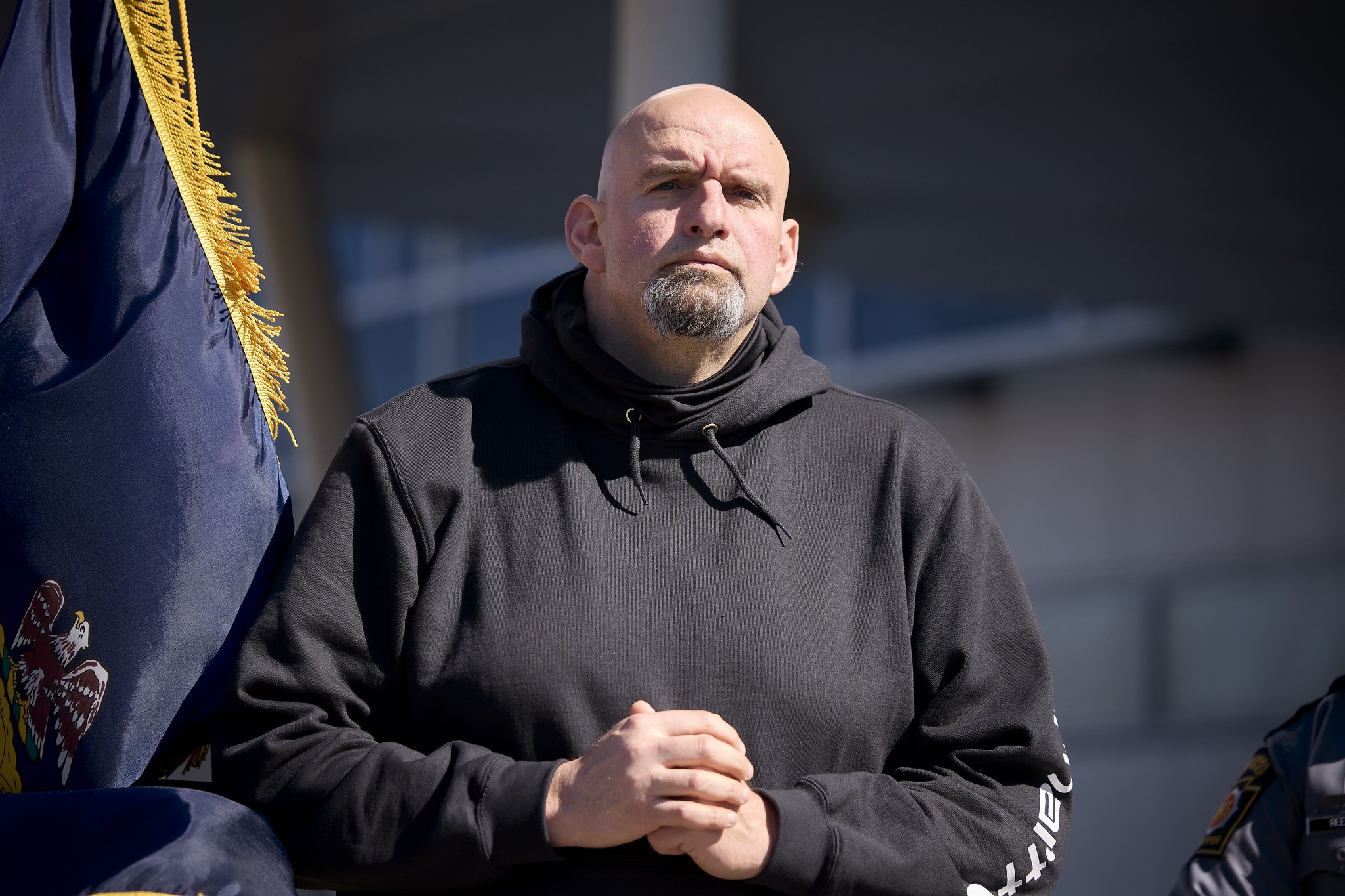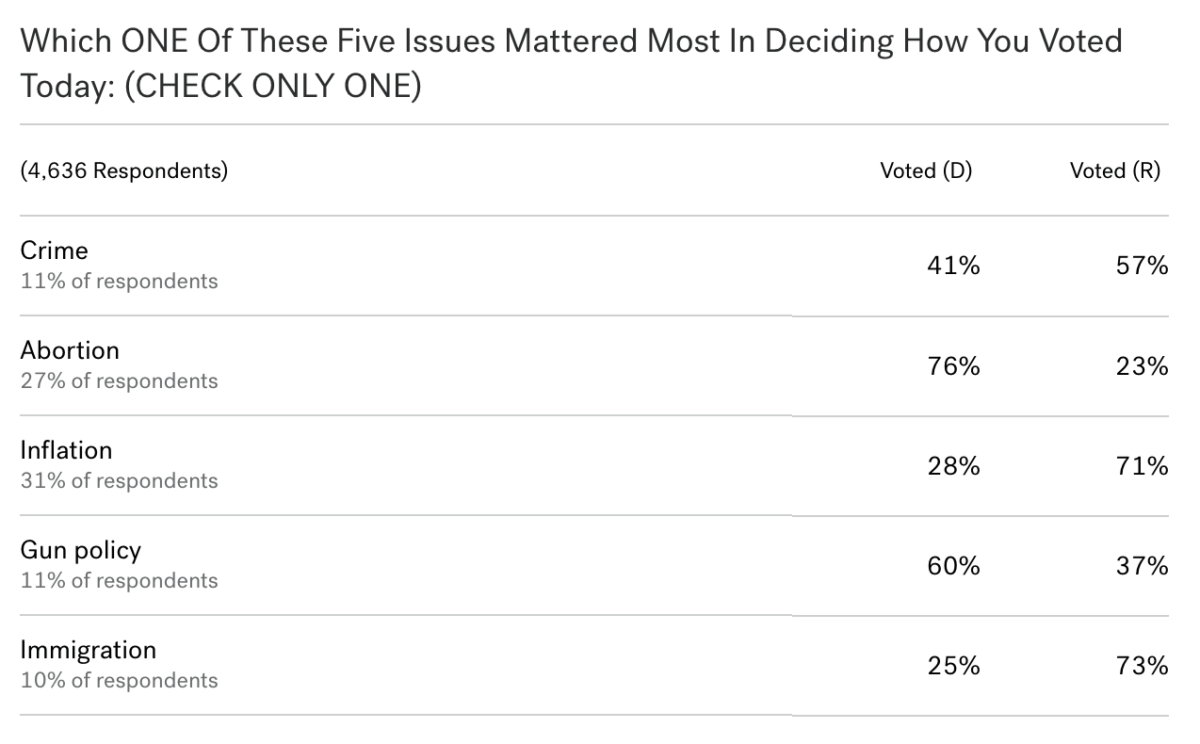Voters Didn’t Buy the ‘Crime Panic’ Narrative. Democrats Should Take Note.
Americans around the country were unmoved by tough-on-crime rhetoric, and instead voted in a string of reform-minded candidates. The results show that it’s time for Democrats to rethink their approach on public safety.

As it turns out, repeatedly yelling “crime” at voters—both literally and figuratively—is not a winning election strategy. Republicans (and a few supporters of New York Republican Lee Zeldin in particular) learned that the hard way this week, after an embarrassing showing in a midterm election that they had portrayed as a referendum on the Democrats’ handling of crime. For a party typically skilled at whipping voters into frothing rage about absolutely nothing, their closing message of fear generated a wave of paranoid, squealing television clips—but failed to resonate with voters.
The results were likely unexpected for politicians on both sides of the aisle. In the lead-up to the election, right-wing fear-mongering had succeeded in putting mainstream Democrats on the defensive, with many jettisoning substantive reform in favor of “funding the police,” and, in some cases, helping to stoke the crime panic themselves. But the results of Tuesday’s elections suggest this political obsession with crime was largely a miscalculation by both parties. In fact, voters appear to have been much more motivated by other issues, with crime coming in a distant third on their list of priorities, far behind inflation and abortion, according to exit polling. Perhaps that’s one reason why scores of reform-minded candidates won major races this election cycle, despite a torrent of campaign ads trying to portray them as soft on, or even in favor of, crime.
On paper, the GOP’s plan read like a perfectly executed scheme: First, wildly exaggerate an actual—though unclear how significant—rise in crime to claim that the nation had descended into lawlessness. Then, blame Democratic-led justice reforms, despite an overwhelming lack of evidence and the fact that some of these reforms literally never happened. Finally, convince Democrats to respond to this bad-faith campaign by showing voters that they, too, are ready to get “tough-on-crime.” Democrats were never going to win this game: Once you buy into the idea that “getting tough” is the best response to crime, Republicans will always be willing to take more extreme measures.
As obvious as this trap was, some establishment Democrats fell for it with all the grace of Wile E. Coyote running into a brick wall with a tunnel painted onto it. In New York, Gov. Kathy Hochul endured months of criticism from both Republicans and members of her own party over the bail reform laws the state passed in 2019, which banned cash bail and pretrial detainers for most small crimes. Both New York City Mayor Eric Adams, a former cop, and Hochul’s opponent, pro-Trump toady Lee Zeldin, spent months falsely blaming the bail-reform laws for increasing crime. Hochul relented in March with a 10-point plan to roll back some of the measures.
Of course, instead of quelling her critics, conservatives smelled blood, redoubled their efforts, and lamented that her plan was still too weak. By the end of the race, Hochul had so fully bought into the Republican narrative that she insulted the city of San Francisco on television. In the days before the election, conservatives and the mainstream media were salivating at the idea of Hochul losing in an upset. In their estimation, New Yorkers were so concerned about crime that one of America’s bluest states was going to elect a guy who’d tried to overturn the 2020 election.
Instead, Hochul won by more than 300,000 votes. The public’s supposed fixation on crime didn’t sway the race, and that trend largely held across the country. In race after race, predictions of a “red wave” fueled by anger over Democrats Not Taking Crime Seriously Enough failed to materialize.
Plus, many of the Democrats who refused to take the GOP’s bait fared just as well, if not better. In one of the most striking examples, Pennsylvania Senate hopeful and noted medical quack Dr. Oz ran nonstop ads claiming his opponent, John Fetterman, took pleasure in releasing bloodthirsty murderers onto the streets for his own fun and enjoyment. But Fetterman stood by his commitment to reforming the legal system and the number of people he’d fought to grant clemency in the past. Even in a purple state like Pennsylvania, Oz’s messaging didn’t land, and Fetterman won by about five percentage points.
In the end, both parties horribly misread the extent to which crime was a motivating factor for voters. According to national exit polling, just 11 percent of voters said crime was the issue they cared most about this year. “Inflation” was first, at 31 percent, followed by abortion, at 27 percent. Among those voters concerned about crime, 57 percent said they trusted Republicans on crime, compared to 41 percent for Democrats. The splits were far higher in every other category polled. If Republicans were looking to capitalize on an issue that they had a clear advantage on, “crime” was the wrong choice.

With those viewpoints in mind, it’s not surprising that many justice reformers won high-profile races across the country. In Los Angeles, Kenneth Mejia cruised to victory in his election for city controller after placing billboards around the city informing people of the amount of taxpayer spending on the LAPD compared to other public services. In Hennepin County, Minnesota, which includes Minneapolis, voters elected a former public defender as the new district attorney. Even in much redder Texas, voters re-elected prosecutors who support decarceral policies in Bexar County, which includes San Antonio, and Dallas County.
Meanwhile, the Democrats who ran hardest on law-and-order were among those who performed the worst. In Florida—which, to be fair, is now solidly a red state—U.S. Rep. Val Demings, a former police chief who ran on having increased congressional funding for law enforcement, lost her Senate race against Marco Rubio by a whopping 17 percent. In Ohio, Democratic Rep. Tim Ryan denounced both police reformers and the Democratic Party as a whole, only to get trounced by the Trump-endorsed J.D. Vance, a man who looks like the result of a love affair between a Navy SEAL and a Care Bear. In Los Angeles, conservative Democrat, real estate magnate, and former anti-abortion Republican Rick Caruso spent a staggering $100 million of his own money to flood local media with messages about alleged lawlessness and his plan to add 1,500 cops to the LAPD’s ranks. But despite his historic spending, Caruso is currently locked in a dead heat with—and appears on track to lose to—U.S. Rep. Karen Bass.
Just a few months ago, the media and politicians from across the spectrum were calling San Francisco District Attorney Chesa Boudin’s defeat in a conservative-led recall the death knell for criminal legal reform. In elections this week, so many left-leaning prosecutors won races that Fox News ran a piece on Thursday mewling that “George Soros backed” candidates had scored a “sweep.”
In a less stupid world, these somewhat surprising results would be a sign to the Democratic Party that it might be time to rethink their approach to crime and public safety. Voters, it seems, are not so consumed by fear of crime—or at least, not so easily manipulated into supporting tough-on-crime responses to it. To the extent Americans do care about crime, many appear unmoved by the Willy Horton tactics of the past, which treat crime as an issue to be cynically exploited, not substantively addressed. If 41 percent of voters who cared most about crime ultimately sided with Democrats, it’s safe to assume that some were voting for candidates explicitly because of their more progressive ideas on public safety, or in some races, in opposition to the draconian platforms supported by Republicans.
But give the Democrats an opportunity to shoot themselves in the foot, and they’ll take it. After Hochul’s victory on Election Night, U.S. Rep. Jerry Nadler of Manhattan, a top ranking Democrat, suggested that the problem with his party’s approach on crime was that they hadn’t blamed it on Republicans enough—even though this blame-game approach had done little other than cause Hochul and the party a headache on the way to eventual victory. Why try to win people over with new ideas—and maybe even a more positive vision for the future!—when you can chuck the “soft-on-crime” potato back and forth until voters’ eyes glaze over?
In the face of this evidence suggesting Democratic voters might be eager for an alternative to tough-on-crime politics that frame the issue exclusively through the lens of policing and punishment, right-wing and centrist apparatchiks have already gone to work this week trying to pull the party rightward. In a Washington Post opinion piece Thursday, Rafael A. Mangual, a fellow at the Manhattan Institute—the group noted for starting the conservative “critical race theory” and trangender panics of the last few years—claimed the only way for Democrats to “blunt” the GOP’s advantage on crime was to ignore all signs of momentum for reform and follow the Republican “playbook.” The very same playbook that just helped them to the worst midterm elections performance of any party in decades.
“Democrats held off a red wave in Tuesday’s elections, but they should beware of misreading the vote,” the piece began. “The party still has a big problem on the issue of crime.”
